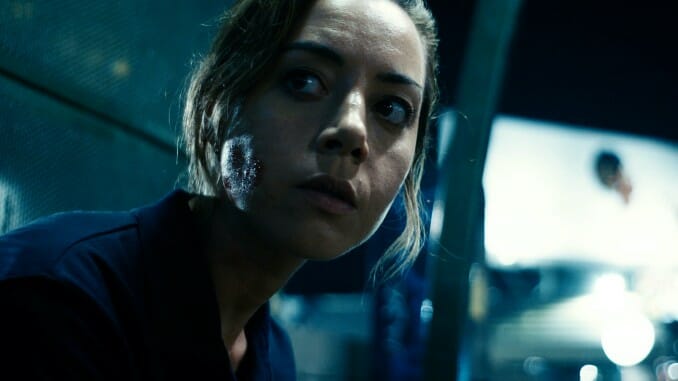Bland Thriller Emily the Criminal Criminally Underuses a Great Aubrey Plaza

This review originally ran as part of Paste’s Sundance 2022 coverage:
As someone anxiously checking back in on when my student loan payments will resume and cursing Joe Biden’s heart every day he doesn’t cancel my debts, I can relate to cinema’s rich canon of alluring and thoroughly explored financial reasons for non-violent crime. Writer/director John Patton Ford’s debut taps into familiar territory with a strong pair of lead performances, but so lightly and blandly that he barely skims anything off the top. A crooked criminal seduction that fires a few stray bullets at job (or, ahem, unpaid internship) interviews, Emily the Criminal might break the law but doesn’t get away with enough to warrant an APB (Aubrey Plaza Bulletin).
Plaza, a driving force of the film as both its star and producer, must’ve seen something in the script that appealed to her—perhaps as another chance to showcase her endless range. And Emily, a desperate caterer haunted by a past felony who lucks her way into a credit card fraud gig, is perhaps as hardened a character as she’s played yet. Hitting so many dead ends has calloused her, though we don’t quite get a look at what’s underneath. Plaza is enjoyably grim in the role (even if her Jersey accent comes and goes), but compared to some of her more nuanced work in things like Ingrid Goes West, it’s a little surface-level and straightforward—but by no means ineffective. It’s through her abilities and those of Theo Rossi, who charmingly plays Youcef (the cute and teddyish broker who instructs her at a sort of backroom shoplifting seminar), that the film holds together.
In fact, I wish it’d spent much longer on the pair, fleshing out their complicated and quickly shifting dynamic. Despite her inexperience, she takes to the work and is far more ruthless than Youcef. Buying up big items, mostly TVs, with stolen info and selling them to third parties in the L.A. underworld seems easy and relatively safe. A much better deal than picking up extra shifts and hoping your next interviewer doesn’t do a background check. Naturally, Emily gets in over her head and leaves her old life behind for this criminal middle manager, pissing off pretty much everyone: Her blue collar colleague who helped get her foot in this unscrupulous door but is too careful to push too far; her bougie art school pal who half-heartedly tries to bring her into the corporate fold. The conventional capitalist routes to success are clearly not working, spelled out for us through these two symbols alongside obvious incidents and slight thrills.
-

-

-

-

- Curated Home Page Articles By Test Admin October 21, 2025 | 3:10pm
-

- Curated Home Page Articles By Test Admin October 21, 2025 | 2:57pm
- Urls By Test Admin October 21, 2025 | 2:57pm
- Curated Home Page Articles By Test Admin October 21, 2025 | 2:55pm
-

-

-

-

-

-

-

-

-

-

-

-

-

-

-

-

-

-

-

-

-

-

-

-

-

-

-

-

-

-

-




































